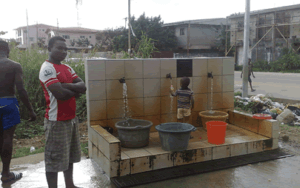CWSA engages stakeholders on reforms
The Community Water and Sanitation Agency (CWSA) has introduced a number of reforms in the management and provision of rural water supply to ensure sustainability of investment while serving the needs of the community.
The reforms have become imperative to avoid the continual breakdown and rehabilitation of pumps and pipes, stop or control interrupted services to the communities, monitor water quality and fill the management knowledge gap at the district and community levels in terms of provision, operation and maintenance.
At a Regional Stakeholders Engagement on the reforms led by the National Communication Committee in Sekondi, it was made known that the reforms were necessitated by the high indebtedness by community managed water systems to ECG and VRA accounting for more than GH₵ 3,000,000, poor accountability and non-revenue water from rural piped water systems.
Mr Ibraham Adork, from the CWSA Head Office, said the ultimate objective of the policy reform was to transform the CWSA into a utility organization having direct responsibility for the provision and management of small towns piped water supply systems while providing point water systems in collaboration with the MMDAs.
The move was to ensure delivery of quality, reliable and affordable water in meeting the SDGs, create decent jobs for unemployed management professionals, apply appropriate technology to water services in rural communities and small towns.
He said the reforms would among others increase access, improve operational efficiency, help apply appropriate technologies to reduce non-revenue water, adopt state of the art technology to address water quality and mobilize revenue for maintenance, expansion and construction of new facilities.
The rest are: professionalize the operation and management of the piped water systems, create support for sustained operations and improve access to sanitation and hygiene services to maximize health benefits.
The new model of professionals managing the water systems under the CWSA and the fading out of community management approach has over the last two years has improved revenue inflows and helped in operations and maintenance of the existing water supply systems.
Mr McCarthy Ofori, the Western Regional Director, said the regional office through the initiative has revived defunct facilities like the water system in Ahanta West, improved upon supply at Mpohor and was doing well in the northern parts of the Region in terms of operations and maintenance.
The reforms have added 624 professional staff, made up of engineers, technician engineers, accountants, water safety specialists, revenue officers, community relations officers in managing the facilities for improved revenue and quality water supply.
Osabarima Kow Ntsi, Omanhene of Mpohor Traditional Area, lauded the CWSA for their efforts at improving water supply in the area.
Source: GNA

